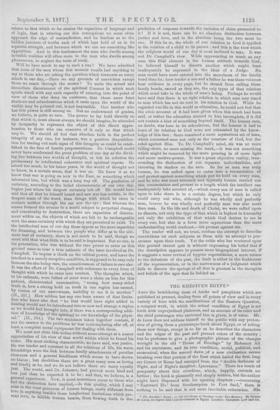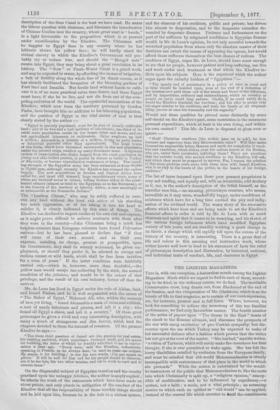THE KHEDIVE'S EGYPT.*
AMID the bewildering mass of books and pamphlets which are published at present, dealing from all points of view and in every- variety of tone with the ramifications of the Eastern Question, a compact work, in which the actual condition of Egypt is set forth with unprejudiced plainness, and an account of its ruler and the chief personages who surround him is given, is of value. Mr_ de Leon does not address himself to the public with any preten- sion of giving them a picturesque book about Egypt, or of telling them new things, except in so far as he describes the characters and the reigns of the past and present rulers of the country ; but he professes to give a photographic picture of the changes. wrought in the old "House of Bondage" by Mehemet Ali and his successors; and its true condition, social, political, and economical, when the second dawn of a new civilisation seema breaking over that portion of the East which hailed the first, long ere Greece or Rome had emerged from the "double darkness of Night, and of Night's daughter, Ignorance." There is a touch of pomposity about this exordium, which, happily, extends no farther ; the book is pleasantly and simply written, but the author might have dispensed with his opening chapters ;—concerning "Eastward Ho 1 from Southampton to Port Said," there is nothing to be said that is not mere inevitable reiteration. His The Khedive's Egypt ; or, the Old House of Bondage under New Masters. By Edwin de Lou, ex-Agent and Consul-General in Egypt. London; Sampson Low and Co. description of the Suez Canal is the best we have read. He states the labour question with clearness, and discusses the introduction of Chinese Coolies into the country, whose great want is" hands," in a light favourable to the proposition which is at present under consideration by the Khedive. The Chinaman will be happier in Egypt than in any country where he has hitherto shown his yellow face ; he will hardly stand the virtual slavery to which the Khedive's Government will pro- bably try to reduce him, and should the "Mongol ants" swarm into Egypt, they may bring about a great revolution in its history. The " New " or Fresh-Water Canal is a grand work, and maybe expected to create, by affording the means of irrigation, a belt of fertility along the whole line of its desert course, as it has already facilitated the formation of the blooming gardens of Port Said and Ismailia. But fertile land without hands to culti- vate it is of no more practical value than desert, and these Egypt must have, if she be to live, and not die from out of the com- peting activities of the world. The equatorial annexations of the Khedive, which now form the territory governed by Gordon Pasha, have brought him no addition to his labouring population, and the position of Egypt in the vital matter of men is thus clearly stated by the author :— "Egypt is sparsely populated, even for its area of already cultivable land ; and of its five and a half millions of inhabitants, one-third of its adult male population reside in the larger cities an towns, and are not agricultural labourers or cultivators. Cairo swallows up half a million ; Alexandria, a quarter of a million, living by petty trades
or industrial pursuits other than agricultural. The large towns of the Delta, which have increased enormously in size and population under the present reign, swallow up many thousands more. A rigorous system of conscription also drafts largely from the rand population its young and able-bodied portion, to perish by disease or battle in Turkey or Abyssinia, or become unproductive consumers at home. The stand- ing strength of the Egyptian army has been estimated at from 60,000 to 70,000 men, although recently the Khedive has reduced the cadres largely. The new acquisitions in Soudan and Central Africa have called for, and must still demand, largo expeditionary corps, many of whom are destined never to return, falling victims either to the pesti- lential climate (almost as fatal to the Egyptian as to the European), or to the ferocity of the warriors of interior Africa, a race seemingly as as untameable as the Comanche Indians."
The "heathen Chines," who may be safely suffered to over- run any laud without the least risk either of his standing too much oppression, or of his taking it into his head to subdue it, is clearly indicated by this state of things. The Khedive has declined to import coolies at his own risk and expense, as it might prove difficult to enforce contracts with them after they were in the country—John Chinaman being a much less helpless creature than European colonists have found Polynesian natives—but he has been pleased to declare that "if they will come of their own accord, and at their own expense, entailing no charge, present or prospective, upon his Government, they shall be warmly welcomed, be given em- ployment, or should they prefer it, be allowed to occupy and reclaim vacant or wild lands, which shall be free from taxation for a term of years." If the latter condition were faithfully .carried out,—which is, however, more than doubtful,—the yellow man would escape tax-collecting by the stick, the normal condition of the fella/teen, and would be to the extent of that privilege, and the result of his own industry, better off than the natives.
Mr. de Leon has lived in Egypt under the rule of Abbas, Said, and Ismail Pashas, and he is well acquainted with the career of 14 The Maker of Egypt," Mehemet Ali, who, within the memory of men yet living, "found Alexandria a mass of ruins and rubbish, a nest of needy fisherman and pirates, and left it a city ; who found all Egypt a chaos, and left it a country." Of these great personages he gives a vivid and very interesting description, with many a touch of strangeness and dim horror, which lend the -chapters devoted to them the interest of romance. Of the present Khedive he says :— " The throe chief passions of Ismail are his passion for real estate, his vaulting ambition, which sometimes o'orleaps itself, and his mania for building, the latter of which he frankly admitted to me in conver-
sation a year ago. Every man,' said the Khedive, reflectively, speaking in French, as he always does, 'is mad on some one subject. My mania is for building ;' to use his own words, uno manic en plane.' It will be well for him and for his people should he discover, ere it be too late, his two other manias, and set to work to curb and to 'correct them."
On the disgraceful subject of Egyptian taxation and the cruelty practised upon the unhappy fellaheen, the author is amply explicit ; he admits the truth of the statements which have been made on those points, and only pleads in mitigation of the conduct of the Khedive that all the responsibility of these terrible things should not be laid upon him, because he is the heir to a vicious system,
and the clamour of his creditors, public and private, has driven him almost to desperation, and to the desperate remedies de- manded by desperate diseases. Patience and forbearance on the part of the sufferers by misplaced confidence in Egyptian finance would, in Mr. de Leon's opinion, be not only merciful towards the wretched population from whom only the absolute master of their destinies can extort the means of appeasing the uproar, but would afford those sufferers themselves the best chance of redress. The creditors of Egypt, urges Mr. de Leon, should have sense enough to see that no people, however patient and long-suffering, can live and work under such treatment as that which the Khedive in- flicts upon his subjects. Here is the argument which the author urges upon the unlucky holders of "Egyptians :"—
" The speedy end of persistence in a policy at once so cruel and so fatal should be insisted upon, even at the cost of a reduction of the interest now paid them out of the sweat and blood of the follaheen, and by impositions, ordinary and extraordinary, which no country or people on earth could long endure. Gladly, if he could safely do it, would the Khedive diminish the burdens; and his offer to assign over his sugar estates to his creditors, and wash his hands of all responsi- bility, proves at once his humanity and his sagacity."
Would not these qualities be proved more distinctly by some self-denial on the Khedive's part, some restriction in the enormous personal expenditure, which at least is his own doing, and within his own control ? This Mr. de Leon is disposed to gloss over or ignore :—
"Shall Christian creditors [the author goes on to ask], be less humane and sagacious than this Mahommedan ruler Will they make themselves responsible before Heaven and earth for complicity in cruel- ties and exactions, which sicken even the calloue hearts of the Moslem, who are, under their constraint, inflicting them ? There are questions that the outside world, who are not creditors to the Khedive, will ask, and which they must be prepared to answer. For, I repeat, the solution of this stern problem rests more with them than with Ismail Khedive, who is as clay in the hands of the potter, in the hands of his foreign creditors."
The list of taxes imposed upon these poor peasant proprietors is very sad reading, and equally sad, with an irresistible, odd drollery in it, too, is the author's description of the fellah himself, as the traveller sees him,—an amusing, picturesque creature, who seems, incredible as it may seem, wonderfully happy, under conditions of existence which have for a long time excited the pity and indig- nation of the civilised world. The weary story of the successive efforts which have been and are being made to set the Khedive's financial affairs in order is told by Mr. do Leon with so much clearness and spirit that it ceases to be wearying, and his sketch of the various foreign influences which have modified Egyptian society of late years, and are steadily working a great change in its fabric, a change which will rapidly tell upon the course of the history of the country, is interesting. There is a great deal of life and colour in this amusing and instructive work, whose writer knows well how to lend to his statement of facts the relief of picturesque description and illustration, by historical, national, and individual traits of conduct, life, and character in Egypt.































 Previous page
Previous page